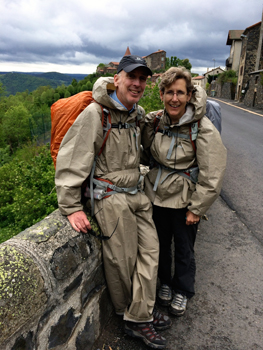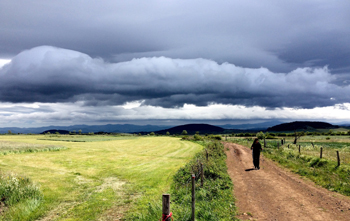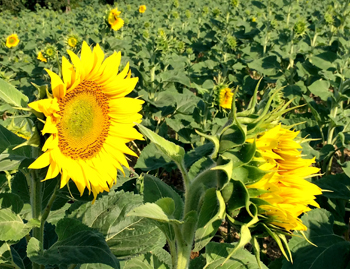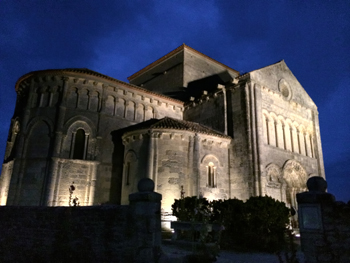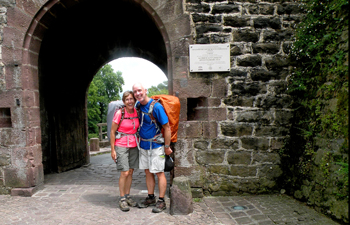Listening for God's Love:
What I Did This Summer
For Sunday August 10, 2014
Lectionary Readings (Revised Common Lectionary, Year A)
Genesis 37:1–4, 12–28 or 1 Kings 19:9–18
Psalm 105:1–6, 16–22, 45b or Psalm 85:8–13
Romans 10:5–15
Matthew 14:22–33
Last month my wife and I returned from walking the 458-mile pilgrimage across southern France called Le Chemin du Puy. The medieval town of Le Puy-en-Velay near Lyon is famous for its lentils and its lace-making. It's also the oldest known starting point of the many medieval pilgrim routes that all converge on Santiago de Compostela in Spain.
In 1866, an archivist named Leopold Delisle discovered a 10th-century manuscript that describes how in the winter of 951, a bishop named Godescalc made the earliest known pilgrimage to Santiago. He started in Le Puy. In the manuscript, a monk named Gomez describes how Godescalc left Le Puy to “reach in haste the lands of Galicia to implore the mercy of Christ and the approbation of Saint James."
Beginning in Le Puy. |
Today the cathedral in Le Puy is a UNESCO World Heritage Site. About 50,000 people a year start their pilgrimage there. Every morning there's a special service to bless pilgrims on their journey. That's where we started, joining the 1100-year-old procession of saints. As we exited out the back archway of the church, a light drizzle made us don our rain gear.
Thirty days later, we finished in St. Jean Pied de Port, the same village where in 2012 we started the 500-mile "Camino Francés" across northern Spain that finishes in Santiago. St. Jean is both an end and a beginning point, for it's situated halfway along the 1,000 mile route from Le Puy to Santiago. Whereas we did the entire pilgrimage in two trips (2012, 2014), it's not unusual to meet people who do the entire 1,000 miles from Le Puy to Santiago in one go.
We met fellow pilgrims from thirty countries and all walks of life. They walk the chemin for many reasons. It's a great way to spend a week of vacation. For others it's the beautiful scenery or the physical challenge.
Wilfred walked in memory of his grandmother, who always wanted to do the camino but never could. Vincent hiked the 1,000 miles with his two dogs and camped out at night. We met several sibling pairs walking together. Helene took her granddaughter. One group included three generations: a mother, daughter, and granddaughter.
Jesus said, "I am the way, the camino, the chemin." |
The combination of fresh air and physical exhaustion is like therapy. People joke that the walking is "addictive." Meeting new people and listening to their stories is one of the biggest blessings. Some people have quit their jobs or their studies to work through life issues. Most all of us are looking for a better way to live.
I resonated with all these motivations. But more than that, I wanted to listen for the love of God. And on the good days, when I was present to the moment and not just grinding out the mileage, that's what I heard.
The wild flowers and song birds reminded me of the words of Jesus: "Listen to the birds. Look at the flowers. Don't worry about your life. Don't be afraid. Your Father in heaven knows what you need. Follow me."
"Look at the flowers," said Jesus. |
This is what Paul calls the "good news" in this week's epistle: "For there is no difference between Jew and Gentile — the same Lord is Lord of all and richly blesses all who call on him, for 'Everyone who calls on the name of the Lord will be saved.'"
In the words of Edwina Gateley's beautiful poem (below), God only wants to look upon you with his love and to bless you. So, "let your God love you."
Paul contrasts two ways of living your life. We can live by the law, which is a sort of spiritual meritocracy in which you get what you earn. You try to prove yourself to God, yourself, and to others.
Living by the law is a terrible idea. It doesn't work. It's impossible to achieve and therefore oppressive. It encourages sanctimony and legalism. And worst of all, it isn't necessary, for God never asks us to prove ourselves. He only asks us to let him love us.
In this sense, a pilgrimage can be a fool's errand if you think you can walk your way to the love of God by some arduous achievement.
Church of St. Radegonde built in 1094, Talmont-sur-Gironde. |
In contrast, Paul commends a life of faith. By faith we accept God's free gifts. By faith we get precisely what we don't deserve, and even more.
Faith believes that God isn't a Divine Accountant or Probation Officer. He's an indulgent father who throws a party for his indigent son. He's like an employer who pays employees a full day's wage even though they only worked for an hour. He's like a lavish wedding host who provides copious amounts of the best wine.
But Romans 10:5–15 isn't really about how much God wants to bless me. It's about how God wants to bless others, and in particular, how he wants to bless the very people for whom I have contempt. In Paul's time and place, that meant convincing conscientious Jewish believers that God wanted to bless pagan Gentiles — "for there is no difference between Jew and Gentile," writes Paul, "the same Lord is Lord of all and richly blesses all who call on him."
For Paul, Jews are no closer to God and Gentiles are no further from God. We're all equidistant to the heart of God's love.
Finishing in St. Jean Pied de Port. |
And so Paul exclaims, "how beautiful are the feet of those who bring [this] good news" (a quotation of Isaiah 52:7) — that God wants to bless all the people that I'm tempted to curse. He includes those whom I'd exclude, and embraces the people I would shun. This good news, he says, is for "all" people and for "everyone." No one is excepted.
In John 14:6, Jesus said, “I am the way.” More literally, in the original Greek, “I am the road.” In the Spanish translation, Jesus is el camino, and in French he's le chemin. Which is to say that he calls each one of us to a pilgrimage of the heart straight to God's free love.
For further reflection:
Julian of Norwich (1342–1416): "The greatest honor we can give almighty God is to live gladly because of the knowledge of his love."
Edwina Gateley, Let Your God Love You
Be silent.
Be still.
Alone.
Empty
Before your God.
Say nothing.
Ask nothing.
Be silent.
Be still.
Let your God look upon you.
That is all.
God knows.
God understands.
God loves you
With an enormous love,
And only wants
To look upon you
With that love.
Quiet.
Still.
Be.Let your God—
Love you.
Image credits: (1–5) Dan and Patti Clendenin.

